 64 citations,
June 2010 in “Journal of The European Academy of Dermatology and Venereology”
64 citations,
June 2010 in “Journal of The European Academy of Dermatology and Venereology” Finasteride improves hair density and thickness in women with hair loss.
 56 citations,
April 2007 in “Journal der Deutschen Dermatologischen Gesellschaft”
56 citations,
April 2007 in “Journal der Deutschen Dermatologischen Gesellschaft” Minoxidil works better for female hair loss than alfatradiol, both safe.
 41 citations,
June 2010 in “Anais Brasileiros de Dermatologia”
41 citations,
June 2010 in “Anais Brasileiros de Dermatologia” Isotretinoin is safe and effective for acne, with common side effects like dry lips; serious side effects are rare.
 37 citations,
October 2015 in “Anais Brasileiros de Dermatologia”
37 citations,
October 2015 in “Anais Brasileiros de Dermatologia” Lichen planopilaris mostly affects women with fair skin and can look different on each person, needing early treatment to prevent hair loss.
 34 citations,
October 2012 in “Journal of Dermatology”
34 citations,
October 2012 in “Journal of Dermatology” Growth factors and microneedle therapy increase hair density in women with hair loss.
 34 citations,
June 2007 in “The Journal of Dermatology”
34 citations,
June 2007 in “The Journal of Dermatology” Most Korean systemic lupus erythematosus patients experienced hair loss, often as non-scarring diffuse hair loss, with non-scarring patch alopecia also common.
 32 citations,
April 2013 in “Anais Brasileiros de Dermatologia”
32 citations,
April 2013 in “Anais Brasileiros de Dermatologia” The document concludes that inherited epidermolysis bullosa is a challenging genetic condition requiring multidisciplinary care and new treatments.
 29 citations,
October 2012 in “Anais Brasileiros De Dermatologia”
29 citations,
October 2012 in “Anais Brasileiros De Dermatologia” Diagnosing hair loss disorders needs clinical, dermoscopic, and histological differences, and checking menstrual cycle, weight changes, drug therapy, and nail changes.
 23 citations,
December 2014 in “Anais Brasileiros de Dermatologia”
23 citations,
December 2014 in “Anais Brasileiros de Dermatologia” Trichoscopy helps tell apart scalp lesions in pemphigus vulgaris and pemphigus foliaceus and is useful for choosing biopsy locations.
 22 citations,
April 2011 in “Anais Brasileiros de Dermatologia”
22 citations,
April 2011 in “Anais Brasileiros de Dermatologia” Hair transplants can lead to hair loss from lichen planopilaris, and patients should be tested and wait two years before the procedure.
 19 citations,
May 2007 in “Dermatologic therapy”
19 citations,
May 2007 in “Dermatologic therapy” The document concludes that various treatments, including laser therapy, are effective for managing pseudofolliculitis barbae, especially in darker skin types.
 15 citations,
January 2014 in “Anais Brasileiros de Dermatologia”
15 citations,
January 2014 in “Anais Brasileiros de Dermatologia” Lupus treatment requires a combination of drugs and therapies, with research needed for new options.
 14 citations,
June 2013 in “Anais Brasileiros de Dermatologia”
14 citations,
June 2013 in “Anais Brasileiros de Dermatologia” Follicular red dots may be a normal feature seen in people with less skin pigmentation, not necessarily indicating a scalp disorder.
 12 citations,
October 2012 in “Anais Brasileiros De Dermatologia”
12 citations,
October 2012 in “Anais Brasileiros De Dermatologia” Dermoscopy effectively diagnoses and evaluates female hair loss treatment.
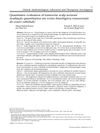 12 citations,
June 2006 in “Anais Brasileiros de Dermatologia”
12 citations,
June 2006 in “Anais Brasileiros de Dermatologia” The study found average numbers for different types of hair follicles in the scalp and observed differences between men and women, suggesting reasons for more common hair shedding in women.
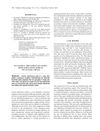 11 citations,
August 2010 in “Pediatric dermatology”
11 citations,
August 2010 in “Pediatric dermatology” Tacalcitol cream effectively and safely treated a rare skin condition called Lichen Spinulosus in two cases.
 8 citations,
July 2014 in “Anais Brasileiros de Dermatologia”
8 citations,
July 2014 in “Anais Brasileiros de Dermatologia” A man's scalp condition was misidentified as hair loss dots but was actually a common follicular disorder.
 6 citations,
February 2003 in “Anais brasileiros de dermatologia/Anais Brasileiros de Dermatologia”
6 citations,
February 2003 in “Anais brasileiros de dermatologia/Anais Brasileiros de Dermatologia” Topical corticosteroid was not more effective than placebo for children's alopecia areata, and atopy did not change treatment results.
 3 citations,
August 2010 in “Anais brasileiros de dermatologia/Anais Brasileiros de Dermatologia”
3 citations,
August 2010 in “Anais brasileiros de dermatologia/Anais Brasileiros de Dermatologia” A rare genetic disease caused severe, worsening hair loss from early childhood with poor treatment results.
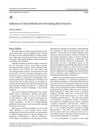 March 2024 in “Journal of skin and stem cell”
March 2024 in “Journal of skin and stem cell” Social media often spreads unreliable skincare advice, leading to potential skin problems, especially in teens.
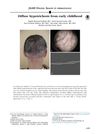 September 2016 in “Journal of The American Academy of Dermatology”
September 2016 in “Journal of The American Academy of Dermatology” The girl has a genetic hair condition causing thin hair since childhood.
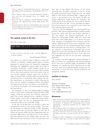 April 2016 in “British Journal of Dermatology”
April 2016 in “British Journal of Dermatology” Eyelashes are important for looks and eye protection, and more people are treating sparse eyelashes; more research is needed to understand eyelash biology and improve treatments.
 198 citations,
October 2011 in “Journal der Deutschen Dermatologischen Gesellschaft”
198 citations,
October 2011 in “Journal der Deutschen Dermatologischen Gesellschaft” Use minoxidil for hair loss; finasteride and dutasteride for men, dutasteride for women.
 196 citations,
June 2008 in “International Journal of Dermatology”
196 citations,
June 2008 in “International Journal of Dermatology” Dermoscopy helps diagnose and manage alopecia areata by showing specific hair changes.
 166 citations,
April 2012 in “Journal of The American Academy of Dermatology”
166 citations,
April 2012 in “Journal of The American Academy of Dermatology” Mostly postmenopausal Caucasian women get Frontal Fibrosing Alopecia, which often includes eyebrow loss and has limited treatment success.
 155 citations,
June 2009 in “International Journal of Dermatology”
155 citations,
June 2009 in “International Journal of Dermatology” Lichen planus is a skin condition that can resolve on its own, is linked to hepatitis C, and increases the risk of skin cancer.
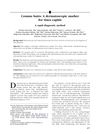 143 citations,
October 2008 in “Journal of The American Academy of Dermatology”
143 citations,
October 2008 in “Journal of The American Academy of Dermatology” Comma hairs are a specific sign of tinea capitis when viewed with videodermatoscopy.
 139 citations,
November 2016 in “Journal of the American Academy of Dermatology”
139 citations,
November 2016 in “Journal of the American Academy of Dermatology” Tofacitinib helped regrow hair in most adolescents with alopecia areata, but more research is needed.
 131 citations,
August 2000 in “International Journal of Dermatology”
131 citations,
August 2000 in “International Journal of Dermatology” Inflammation may be linked to hair loss, and targeting specific enzymes could help treat it.
 126 citations,
April 2006 in “International Journal of Dermatology”
126 citations,
April 2006 in “International Journal of Dermatology” The conclusion is that FFA and LPP have similar scalp biopsy features, making them hard to distinguish histologically, and FFA may be a specific kind of scarring hair loss.






























